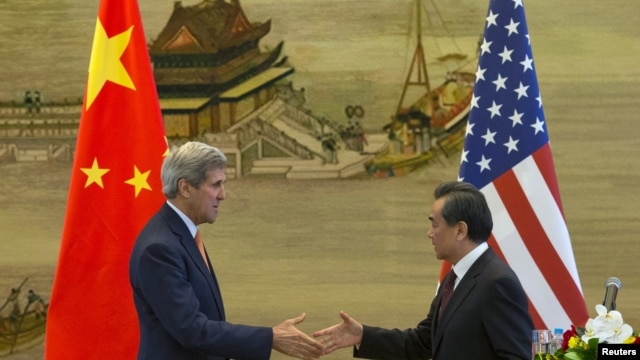
The United States and China say they are talking about their differences, including disputes in the South China Sea, but comments from the countries' two top diplomats Saturday revealed that Beijing and Washington still remain divided over the contentious issue.
The United States and China continue to find a wide range of areas in which they can cooperate — from efforts to resolve the Iran nuclear issue, to climate change and the fight against Ebola, but Beijing’s territorial claims remain a persistent source of concern for Washington.
China has been building up reefs and outcroppings at seven sites in disputed waters in the South China Sea, constructing a military-sized airstrip on Fiery Cross reef and massively expanding their total area.
The Philippines has called for “urgent action,” and the Association of Southeast Asian Nations recently warned that the effort “may undermine peace.”
US concerns
The United States is concerned, and Secretary of State John Kerry repeated that view during a visit to Beijing Saturday following meetings with his Chinese counterpart Wang Yi.
"I urged China through Foreign Minister Wang to take actions that will join everybody in helping to reduce tensions and increase the prospect of a diplomatic solution,” he said.
Although Kerry says Wang agrees that the region needs “smart diplomacy” to help conclude a code of conduct between Southeast Asia Nations and Beijing, and not “outposts and military strips,” China’s Foreign Ministry says the development is fully within the scope of its sovereignty.
Wang said that China’s determination to safeguard its sovereignty and territorial integrity is "as hard as a rock."
Neither Kerry nor Wang responded to a question about plans that the United States is considering using aircraft and military ship patrols in the South China Sea. According to reports, the U.S. Defense Department is considering using aircraft and military ship patrols to ensure freedom of navigation and show how critical Washington feels the area is to global trade.
Avoiding misunderstanding, miscalculation
Wang Yi says it is ok to have differences over the issue as long as the two can work to avoid misunderstanding and miscalculation.
Wang said that while “China and the United States do have differences on the South China Sea issue, the two also have a lot of agreement.” He added that “both hope to maintain peace and stability in the South China Sea and are committed to freedom of navigation enshrined in international law.”
During his two-day visit to Beijing, Secretary Kerry will meet with military and civilian leaders including President Xi Jinping on Sunday.
The two diplomats stressed their hope for the successful conclusion of the Iran nuclear talks. Kerry also said it is possible that the Iran nuclear talks could have an impact on North Korea and help push it in the same direction.
“But whether or not the DPRK [North Korea] is capable of internalizing that message or not, that’s still to be proven,” he said.
Kerry says that in addition to discussing areas of difference and agreement, other key aims of his visit are to make preparations for a productive round of high-level economic and security talks in Washington next month, and for President Xi’s first state visit to the United States later this year.
Kerry will hold talks on Sunday with President Xi Jinping. H ahead of a Strategic and Economic Dialogue meeting later this year and the Chinese leader's planned visit to the U.S. in September.

No comments:
Post a Comment